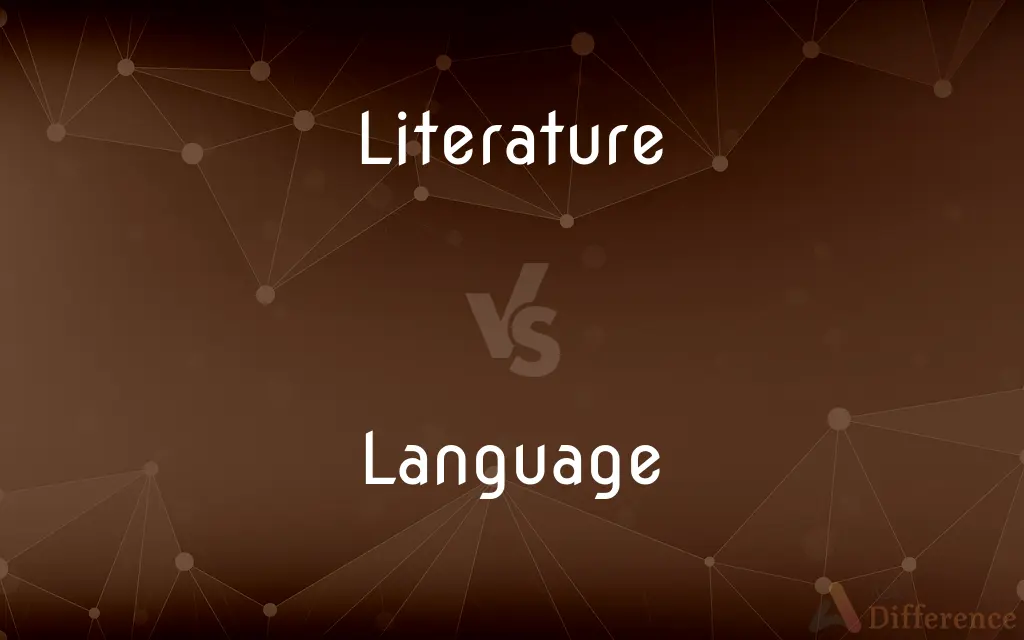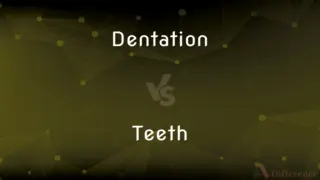Literature vs. Language — What's the Difference?

Difference Between Literature and Language
ADVERTISEMENT
Compare with Definitions
Literature
Literature broadly is any collection of written work, but it is also used more narrowly for writings specifically considered to be an art form, especially prose fiction, drama, and poetry. In recent centuries, the definition has expanded to include oral literature, much of which has been transcribed.
Language
A language is a structured system of communication used by humans, based on speech and gesture (spoken language), sign, or often writing. The structure of language is its grammar and the free components are its vocabulary.
Literature
Written works, especially those considered of superior or lasting artistic merit
A great work of literature
Language
Communication of thoughts and feelings through a system of arbitrary signals, such as voice sounds, gestures, or written symbols.
Literature
The body of written works of a language, period, or culture.
ADVERTISEMENT
Language
Such a system including its rules for combining its components, such as words.
Literature
Imaginative or creative writing, especially of recognized artistic value
"Literature must be an analysis of experience and a synthesis of the findings into a unity" (Rebecca West).
Language
Such a system as used by a nation, people, or other distinct community; often contrasted with dialect.
Literature
The art or occupation of a literary writer.
Language
A system of signs, symbols, gestures, or rules used in communicating
The language of algebra.
Literature
The body of written work produced by scholars or researchers in a given field
Medical literature.
Language
(Computers) A system of symbols and rules used for communication with or between computers.
Literature
Printed material
Collected all the available literature on the subject.
Language
Body language; kinesics.
Literature
(Music) All the compositions of a certain kind or for a specific instrument or ensemble
The symphonic literature.
Language
The special vocabulary and usages of a scientific, professional, or other group
"his total mastery of screen language—camera placement, editing—and his handling of actors" (Jack Kroll).
Literature
The body of all written works.
Language
A characteristic style of speech or writing
Shakespearean language.
Literature
The collected creative writing of a nation, people, group, or culture.
Language
A particular manner of expression
Profane language.
Persuasive language.
Literature
(usually preceded by the) All the papers, treatises, etc. published in academic journals on a particular subject.
Language
The manner or means of communication between living creatures other than humans
The language of dolphins.
Literature
Written fiction of a high standard.
However, even “literary” science fiction rarely qualifies as literature, because it treats characters as sets of traits rather than as fully realized human beings with unique life stories. —Adam Cadre, 2008
Language
Verbal communication as a subject of study.
Literature
Learning; acquaintance with letters or books.
Language
The wording of a legal document or statute as distinct from the spirit.
Literature
The collective body of literary productions, embracing the entire results of knowledge and fancy preserved in writing; also, the whole body of literary productions or writings upon a given subject, or in reference to a particular science or branch of knowledge, or of a given country or period; as, the literature of Biblical criticism; the literature of chemistry.
Language
(countable) A body of words, and set of methods of combining them (called a grammar), understood by a community and used as a form of communication.
The English language and the German language are related.
Deaf and mute people communicate using languages like ASL.
Literature
The class of writings distinguished for beauty of style or expression, as poetry, essays, or history, in distinction from scientific treatises and works which contain positive knowledge; belles-lettres.
Language
(uncountable) The ability to communicate using words.
The gift of language
Literature
The occupation, profession, or business of doing literary work.
The origin of all positive science and philosophy, as well as of all literature and art, in the forms in which they exist in civilized Europe, must be traced to the Greeks.
Learning thy talent is, but mine is sense.
Some gentlemen, abounding in their university erudition, fill their sermons with philosophical terms.
Language
(uncountable) A sublanguage: the slang of a particular community or jargon of a particular specialist field.
Legal language;
The language of chemistry
Literature
Creative writing of recognized artistic value
Language
The expression of thought (the communication of meaning) in a specified way; that which communicates something, as language does.
Body language;
The language of the eyes
Literature
The humanistic study of a body of literature;
He took a course in Russian lit
Language
A body of sounds, signs and/or signals by which animals communicate, and by which plants are sometimes also thought to communicate.
Literature
Published writings in a particular style on a particular subject;
The technical literature
One aspect of Waterloo has not yet been treated in the literature
Language
A computer language; a machine language.
Literature
The profession or art of a writer;
Her place in literature is secure
Language
(uncountable) Manner of expression.
Language
(uncountable) The particular words used in a speech or a passage of text.
The language used in the law does not permit any other interpretation.
The language he used to talk to me was obscene.
Language
(uncountable) Profanity.
Language
A languet, a flat plate in or below the flue pipe of an organ.
Language
To communicate by language; to express in language.
Language
An admonishment said in response to vulgar language.
Language
Any means of conveying or communicating ideas;
Language
The expression of ideas by writing, or any other instrumentality.
Language
The forms of speech, or the methods of expressing ideas, peculiar to a particular nation.
Language
The characteristic mode of arranging words, peculiar to an individual speaker or writer; manner of expression; style.
Others for language all their care express.
Language
The inarticulate sounds by which animals inferior to man express their feelings or their wants.
Language
The suggestion, by objects, actions, or conditions, of ideas associated therewith; as, the language of flowers.
There was . . . language in their very gesture.
Language
The vocabulary and phraseology belonging to an art or department of knowledge; as, medical language; the language of chemistry or theology.
Language
A race, as distinguished by its speech.
All the people, the nations, and the languages, fell down and worshiped the golden image.
Language
Any system of symbols created for the purpose of communicating ideas, emotions, commands, etc., between sentient agents.
Language
Any set of symbols and the rules for combining them which are used to specify to a computer the actions that it is to take; also referred to as a computer lanugage or programming language; as, JAVA is a new and flexible high-level language which has achieved popularity very rapidly.
Language
To communicate by language; to express in language.
Others were languaged in such doubtful expressions that they have a double sense.
Language
A systematic means of communicating by the use of sounds or conventional symbols;
He taught foreign languages
The language introduced is standard throughout the text
The speed with which a program can be executed depends on the language in which it is written
Language
(language) communication by word of mouth;
His speech was garbled
He uttered harsh language
He recorded the spoken language of the streets
Language
A system of words used in a particular discipline;
Legal terminology
The language of sociology
Language
The cognitive processes involved in producing and understanding linguistic communication;
He didn't have the language to express his feelings
Language
The mental faculty or power of vocal communication;
Language sets homo sapiens apart from all other animals
Language
The text of a popular song or musical-comedy number;
His compositions always started with the lyrics
He wrote both words and music
The song uses colloquial language
Share Your Discovery

Previous Comparison
Dentation vs. Teeth
Next Comparison
Balked vs. Baulked













































